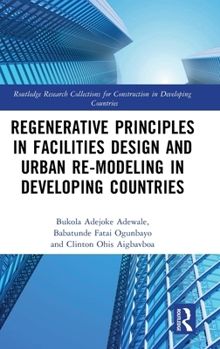Regenerative Principles in Facilities Design and Urban Re-modeling in Developing Countries
In the face of rapid urbanization and environmental challenges, the developing world stands at a crossroads. Conventional sustainable design, often modelled on Global North precedents, is proving insufficient to address the deep-seated infrastructural and socio-economic complexities of these unique contexts. This book argues for a radical shift from simply minimizing harm to actively healing and restoring our communities and ecosystems through regenerative architecture.
Moving beyond theory, this work provides a critical and practical roadmap for applying regenerative principles specifically in the challenging environments of developing nations. We delve into the core of what makes regeneration different, showcasing how it can produce net-positive energy and water systems, enhance biodiversity, foster social equity, and create economic value where it is needed most.
The heart of this book lies in its actionable insights and real-world evidence. Through a series of detailed case studies-from innovative adaptive reuse in Ghana and decentralized renewable systems in Rwanda to community-driven projects in South Africa, we demonstrate viable solutions. These are contrasted with lessons from pioneering examples in Sweden, the UK, and Canada, not as blueprints to copy, but as sources of adaptable strategies.
A significant focus is given to a deep-dive case study of Nigeria, offering a nuanced examination of its colonial architectural legacy, current urban pressures, and the emergent regenerative strategies that blend vernacular wisdom with modern innovation.
This book is more than a reference; it is a call to action. It provides policymakers with frameworks for supportive regulations, offers practitioners design strategies and performance metrics, and equips students and researchers with a comprehensive conceptual foundation. By championing an approach that is both context-sensitive and aspirational, this book serves as an essential guide for anyone committed to building resilient, vibrant, and equitable urban futures in the developing world and beyond.





